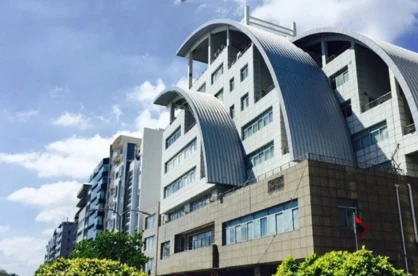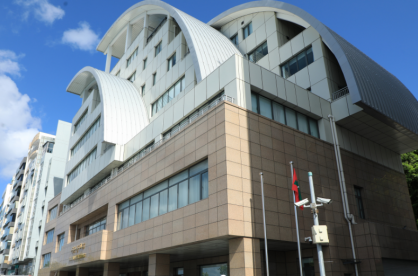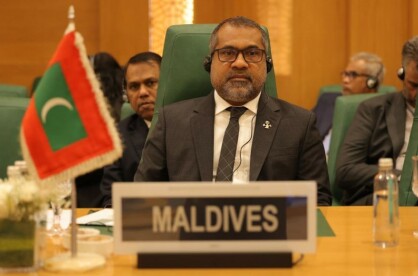WAMCO vs. Malé City Council
There are no winners in this trash war — but the public are the losers.

Source: WAMCO FB
There are no winners in this trash war — but the public are the losers.

Source: WAMCO FB
State Owned Enterprises, or SOEs, make up the backbone of a lot of infrastructure that keeps the nation running day to day. STELCO provides standardised electricity services, MWSC is in charge of clean water and STO provides a steady supply of essential food and fuel, all working in their respective lanes to cater to the needs of the society. However, the most recent spat between the Waste Management Corporation Ltd (WAMCO) and the Malé City Council outlines a much dirtier, inefficient facet of waste management, and the provision of all public services.
SOEs are, for in all intents and purposes, non-partisan — at least in theory. Whatever administration takes the vote, they are to continue providing services, adjust to certain policy changes, evolve, and grow to serve the people better. While restructuring the management may fall under the incumbent administration’s powers, a politicised approach is not always the best one. Beyond civil servants, these companies are charged with a public duty, and being an independent enterprise is only to both lessen the burden of administration, and execution by the government, and also to generate income as a taxable company. This independence is not to further draw political battle lines and pressure points, yet that is what the recent reality has shown.
In the middle of August, the Mayor of Malé City, Dr. Mohamed Muizzu, came forward and accused the government of using SOEs to hinder the work of local councils. To provide context, the local council elections were won by an opposition majority, with Muizzu, a prominent member of the PPM as well as the former Minister for Housing under the Yameen Administration, being elected as Mayor. The obvious bad blood between the two ‘polar opposite’ parties has always been a prominent hinderance where it comes to political assignments, as well as in administration, yet the fact that SOEs were used to further play political ping-pong was a new low. The Mayor accused SOEs of not giving due cooperation in carrying out civic duties, the brunt of it faced by the public.
However, over the course of the month further elements came to light. These appear to give weight to the Mayor’s claims but also seem to tarnish the Council's claims as well. It seems more like both sides may be to blame.
On 15 August, the Mayor further exacerbated the rift by claiming WAMCO, with their budget of MVR3 million under an agreement between the two entities, is still unable to properly manage waste disposal in the city. This sort of public criticism raises eyebrows regarding the public service institution. So did the apparent misquoting by the Mayor when he stated that WAMCO was going to resume their usual practice of going into buildings to collect disposal bags, which the SOE had publicly denied at the time. This further aggravated the growing discord between these two entities, ultimately creating confusion for the public.
Two weeks later, WAMCO shifted back to their previous method, proving the Mayor’s statements.
Mayor Muizzu had earlier claimed that the Council had made payments to WAMCO under an agreement to collect garbage left on streets. However, in mid-September, WAMCO publicly denied that it had agreed to any such undertaking. The Managing Director of WAMCO claimed that the agreement only covered sweeping the streets and not picking up extra waste. While the general public might not see a distinction here, WAMCO maintained that removing large waste bags requires a lot more manpower and logistics.
Yet, when the City Council pulled the almost juvenile stunt of dumping trash in front of the gates of WAMCO, the public lost any semblance of decorum towards the two entities.
Interestingly enough, it was the Deputy Mayor who stepped up and apologised for this move, observed by many as a backlash aimed at the SOE. He claimed that the whole dumping at the gates fiasco was a result of miscommunication. The apology and the excuse were quite weak, and of little consequence, to the frustrated citizen, while the shifting of the blame down to the lower echelons of City Council staff borders past shameful.
WAMCO then put the City Council, as well as some households, on the spot by claiming they were owed MVR30.5 million and MVR59 million for services provided, respectively. While there may be many facets to the reasons why the City Council had not footed their bill, the public is actually in dismay due to the changes in WAMCO payment rules, which stipulates that it has to be the owners of the buildings who have to register the household accounts for all the tenants, be it rented or permanent residences. Many among the public have claimed that most building owners are either unresponsive to this change or finding it difficult to coordinate the registration due to having to locate building registries and all the required documentation.
While this article focuses on the most recent developments between WAMCO and the Malé City Council, the problems described here are common stories heard across country - such as the issues between FENAKA and local island communities, and STELCO and MWSC being accused of spiking bills by extortionate amounts. The actions of officials in local councils, elected to serve the public, have led to various such cases of chaos, while addressing the genuine problems faced by the public is usually left by the wayside.
To alleviate this issue, one thing that could be done is to allow the local councils to hold a stake in these SOEs. This would ensure that taxpayer funds go into investing in the SOEs, beyond the budgeted amounts, and their efficiency would raise value, ultimately benefiting the councils with profits, and the people with better services.
Furthermore, council representatives and the heads of SOEs need to simmer down on discrediting the public and move towards more amicable consultations. There needs to be cohesion between the entities, and more transparency by publishing minutes of meetings and proposed plans. Beyond that, another step could be to have a city council representative to sit on the board of the SOE, and a representative of the SOE to sit with the city and local council, as either an advisor or to provide assistance in planning and execution.
There are a lot more technical issues and disputes that have been happening for a long while now, and it only goes to show that the system in place right now is not as accommodating as it should be. Demanding that the ones in power and authority stop behaving like they do is one thing, and if structural changes are resolved at the earlier, then the public will not have to bear the brunt of such failure.
Administrative bodies of all levels need to do, and be, better.



